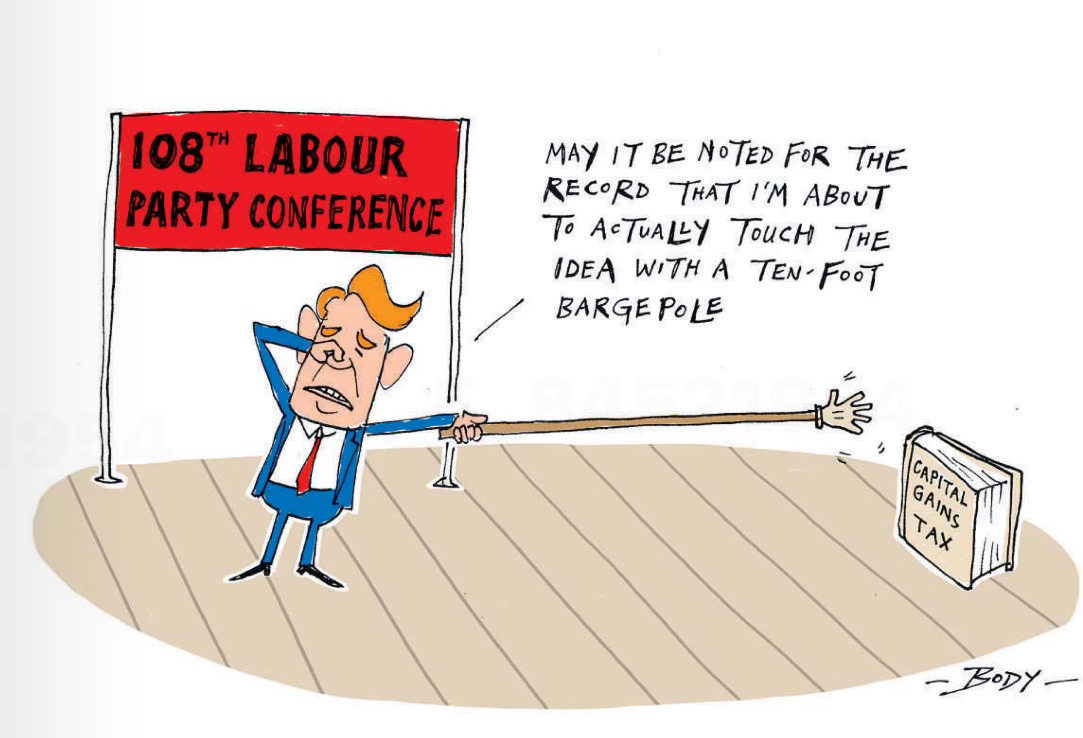
Good morning. Labour appears to be leaning back towards a Capital Gains Tax and away from a wealth tax. Meanwhile, Christopher Luxon says his Government is relearning the economic lessons learned in the early 1990s.
Labour leaning back towards Capital Gains Tax
Labour held its annual conference in Christchurch over the weekend and voted to continue on with policy work on a Capital Gains Tax and a Wealth Tax, but close watchers are seeing preference developing in Labour’s Policy Council in favour of a Capital Gains Tax.
Here’s Vernon Small in his Sunday Star Times-$$$ column:
Since opening the door to a wealth tax or a CGT as part of 2026 policy, Hipkins has been careful not to back either definitively. But any signals he has given point to a CGT. The parliamentary caucus and the weight of the 11 affiliated unions are thought to lean that way too.
The document put to the conference by Labour’s policy council keeps both options alive for further work. It says Labour will implement a capital gains tax on assets or net-wealth tax on wealth above a reasonable threshold. Both options exclude the family home.
That takes the final decision away from the membership and into the hands of the policy council. A widely-held view (including by this commentator) that the council will back a wealth tax appears to be in doubt.
The conference faced a range of amendments that would variously give CGT the edge. But there is another from a well-organised group within the party calling themselves “Win the Wealth Tax”.
This group organised a standing-room-only meeting on the first evening of the conference that pondered a wealth tax alongside other progressive policies.
Their proposed amendment would see Labour back a wealth tax while investigating a CGT only as a “complementary measure”. It envisaged a 1.5 per cent tax on net wealth above $5 million per individual, excluding the family home.
They argued detailed design work for a wealth tax had already been done by Treasury and Inland Revenue as part of the 2023 proposal, and that the politics are “explicitly clear” by taxing the wealthiest 1 per cent to support everyone else.
But the amendment was defeated by about 55 to 45 per cent on the conference floor.
Certainly, CGT is better understood locally and more widely used in other countries. But the simplicity of a wealth tax affecting only the top 1 per cent is an easier sell than the exclusions, inclusions and fine print of a CGT. Vernon Small via SST-$$$
Here’s Hipkins’ full speech to the conference (22 mins onwards), in which he said Labour would (not) join AUKUS, and his news conference afterwards (1:11 onwards), in which he appeared to confirm a Labour Government would pull New Zealand out of AUKUS if National had committed to it in Government.
Luxon learning lessons that are 35 years old
PM Christopher Luxon was quizzed in depth on yesterday’s Q+A by Jack Tame (full video below) about the sagging economic outlook in the last year, in particular New Zealand’s worse performance than other countries with the same inflation dynamics. Luxon blamed Labour and said this (bolding mine):
“Essentially what we're dealing with is relearning some economic laws around spending and inflation and interest rates and growth and unemployment. We've made some good progress around the cost of living, getting inflation back down, getting interest rates down. We've got good levels of consumer confidence, the highest it's been in three years, high levels of business confidence, the highest in a decade.” Christopher Luxon in the Q+A interview with Jack Tame below.
Challenged on why New Zealand was performing poorly with the same inflation dynamics as others, Luxon said:
“What I’s just to say to you is: we've kind of forgotten the laws of economics I'd say that we learned 35 years ago and we've taken good economic management for granted. When you increase spending by 84%, when you drive up inflation domestically, you have to then take interest rates up. When you take interest rates up, you've put the economy into recession, and when the economy is in recession it leads to unemployment.
“That's why we've always said if you actually care about working New Zealanders you actually are fiscal conservatives you actually run the economy well because the pain is ultimately unemployment and that's what we've actually been seeing.
“The last 3 to 6 months is the lagged effect of that. If you're a business that's hung in there with high inflation, high interest rates, suppressed demand, the last thing you're left with is is actually laying workers off and we've seen some of that this year so that's why we're working our way through those five components (Government spending, inflation, interest rates, unemployment, growth) but you've got to work through them sequentially so you get the show going.”
“You have to take your medicine. You actually have to work through the economy and that's what we're doing. You get spending under control as we have been doing. We haven't thrown the economy into austerity. We've got a very balanced approach to that.” Luxon.
In my view, Luxon is pointing to the Ruth Richardson ‘lessons’ from 1990-93 when she slashed spending dramatically and worsened unemployment to 11% at the same time as Don Brash was running high interest rates to get rid of inflation. Prime Minister Jim Bolger sacked Richardson in 1993 when it became clear the medicine was making the patient sicker.
The ‘austerity medicine’ economic lesson has been proven repeatedly over the last 35 years to have failed to restart economic growth.
Luxon is also plain wrong when he says his Government is not pursuing an austerity approach. Treasury advised the Government months ago that its fiscal track would generate the biggest real per-capita cuts in New Zealand’s economic history, bigger even than under Richardson.
The Kākā’s Journal of record for Monday, December 2
Housing & health: A five-year evaluation of the Healthy Homes Initiative found that every dollar spent by Te Whatu Ora on the program was associated with $5.07 in health savings over the following five years, including via an 18.6% decrease in all-cause hospitalisations among program participants. Health Minister Dr. Shane Reti said the Government is “committed” to the program, which he called a positive example of a social investment approach. RNZ
Infrastructure: Minister for Infrastructure Chris Bishop announced the opening of National Infrastructure Funding and Financing Limited (NIFFCo), a new infrastructure agency focused on developing public private partnerships. Bishop said NIFFCo was "repurposed" from Crown Infrastructure Partners, which was set up in 2009 to manage the national rollout of ultra-fast broadband.
Economy & politics: In a speech to the Labour Party Conference 2024, Labour Leader Chris Hipkins accused the Government of cancelling “almost all action” on climate change and exacerbating the cost-of-living crisis via "trickle-down economics". National's Finance Spokesperson Nicola Willis claimed in response that Labour increased public spending by 80%, and said National would not implement a capital gains tax or a wealth tax.
Foreign policy: Labour Leader Chris Hipkins said that, in order to maintain NZ's foreign policy independence and nuclear-free status, NZ would not join AUKUS under Labour. Hipkins said Labour is "deeply concerned" by what he called the Government's efforts to get closer to the US. 1News
Health & politics: Labour Leader Chris Hipkins promised that a Labour Government would build the new Dunedin Hospital "as it was committed to prior to election 2023." In September this year, the Government decided to either down-scale the new hospital, or cancel the project and retro-fit the existing hospital instead. Otago Daily Times
Vaping and equity: The Public Health Communication Centre noted that the number of NZers over age 15 who vape daily increased from 3.5% in 2019/20 to 11.1% in 2023/4, with people living in the most deprived neighborhoods more than twice as likely to vape daily than those in the least deprived. The PHCC said the proportion of young people vaping suggests the increase is significantly due to people who have never smoked taking up vaping.
Cartoon du jour: ‘Careful what you reach for’
Timeline-cleansing nature pic
Mā te wā
Bernard















Share this post